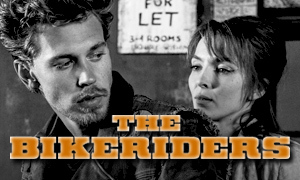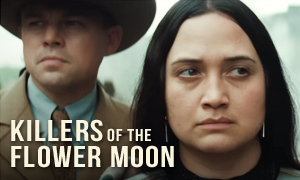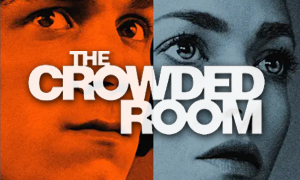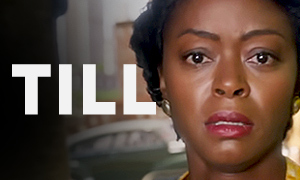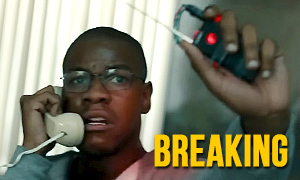Detroit: History vs. Hollywood
| REEL FACE: | REAL FACE: |
John Boyega
Born: March 17, 1992 Birthplace: Peckham, London, England, UK | Melvin Dismukes
Born: September 8, 1942 Birthplace: Michigan, USA |
Will Poulter
Born: January 28, 1993 Birthplace: England, UK | David Senak
Born: June 18, 1944 Birthplace: Michigan, USA Renamed "Krauss" in the movie and fictionalized |
Jack Reynor
Born: January 23, 1992 Birthplace: Longmont, Colorado, USA | Ronald August
Born: abt 1946 Birthplace: USA Renamed "Demens" in the movie |
Ben O'Toole
Born: abt 1989 Birthplace: Brisbane, Australia | Robert Paille
Born: July 4, 1935 Birthplace: Michigan, USA Death: September 9, 2011, Roseville, Michigan, USA Renamed "Flynn" in the movie |
Algee Smith
Born: November 7, 1994 Birthplace: Saginaw, Michigan, USA | Larry Reed
Birthplace: USA |
Jacob Latimore
Born: August 10, 1996 Birthplace: Milwaukee, Wisconsin, USA | Fred Temple
Born: 1949 Birthplace: USA Death: July 26, 1967, Algiers Motel, Detroit, Michigan, USA (shot by police) |
Jason Mitchell
Born: January 5, 1987 Birthplace: New Orleans, Louisiana, USA | Carl Cooper
Born: abt 1950 Birthplace: USA Death: July 26, 1967, Algiers Motel, Detroit, Michigan, USA (gunshot wounds) |
Nathan Davis Jr.
Born: January 18, 1994 Birthplace: Long Beach, California, USA | Aubrey Pollard
Born: abt 1948 Birthplace: USA Death: July 26, 1967, Algiers Motel, Detroit, Michigan, USA (shot by police) |
John Krasinski
Born: October 20, 1979 Birthplace: Newton, Massachusetts, USA | Norman Lippitt
Born: June 21, 1936 Birthplace: Detroit, Michigan, USA Renamed "Attorney Auerbach" in the movie |
Hannah Murray
Born: July 1, 1989 Birthplace: Bristol, England, UK | Juli Hysell
Born: abt 1949 Birthplace: Michigan, USA Photo circa 2017 |
When did the Detroit riots take place?
In researching the Detroit true story, we learned that the riots began around 3:15 a.m. in the early morning of Sunday July 23, 1967 and lasted five days, ending for the most part on July 27.
How closely does the Detroit movie stick to the real events?
Screenwriter Mark Boal admits that he took poetic license with a lot of what is unknown or disputed in the cases related to the Detroit riots and the Algiers Motel killings. "I employed poetic license, under a self-imposed rule to never stray from what I understood to be the underlying truth of a scene or an event," says Boal. "This script is built on a sturdy base of journalism and history, but it is not the same as journalism or history, nor does it aspire to be. As a screenwriter, I take the responsibility of being the creator of a tale, of transforming these raw materials into a drama." Boal commissioned a research team and scoured documents, police files, and historical record, including John Hersey's book The Algiers Motel Incident. -Vulture
How did the 1967 Detroit riots begin?
In the early morning hours of July 23, 1967, police raided an unlicensed after-hours drinking club in the office of the United Community League for Civic Action, a community civil rights group that backed local political candidates and helped to give the neighborhood a collective voice. The group's office was located on the upper floor of the empty Economy Printing building at 9125 12th Street. Police expected only a few patrons inside but found 82 African-Americans celebrating the return of two local soldiers from Vietnam. The Detroit police decided to arrest all those in attendance.
While the police were inside waiting to haul off the revelers, a crowd began to form in the street outside. The riot is said to have started when Walter Scott III, the son of the unlicensed club's owner, threw a bottle at a police officer (at least that's what Scott later claimed in a memoir). When the police left the scene, the crowd (now a mob) began looting a clothing store next door. It didn't take long for widespread looting to erupt throughout the neighborhood. Initially, the police force was too small and did little but watch. Since it was a Sunday, it took longer for Police Commissioner Ray Girardin to mobilize the Michigan National Guard, state police, and the Wayne County sheriffs. As a result, the first arrest didn't happen until 7 in the morning.
By mid-afternoon, a raging fire had broken out in a grocery store and the mob prevented firefighters from extinguishing it, causing it to spread uncontrollably. The looting had also spread, reaching other parts of Detroit.
What social conditions led to the riots?
Detroit was a powder keg of racial tension waiting to explode, and it did in the summer of 1967. The Civil Rights Movement had been well underway for more than a decade. Blacks were tired of being abused by the police and treated unfairly. Racism and the demographic makeup of Detroit set the stage for the unrest.
Was Detroit's police force almost entirely white in 1967?
Yes. Fact-checking the Detroit movie revealed that the demographic makeup of the police force was not in line with the demographic makeup of the city. The police force was 95% white, while the city was 40% black. There were approximately 5,500 cops on the police force and only 100 were black. -CBS This Morning
How many people lost their lives during the Detroit riots?
During our investigation into the true story behind the Detroit movie, we discovered that a total of 43 people were killed during the Detroit riots, including the three young black men at the Algiers Motel, which is the focus of Kathryn Bigelow's movie. 33 of those killed during the riots were black and 10 were white. Approximately 1,189 people were injured and over 7,200 were arrested.
Is the movie based on the book The Algiers Motel Incident?
Was Will Poulter's character as racist in real life?
Will Poulter's character, the evil Philip Krauss, is largely fictional. He most closely correlates to 23-year-old Vice Patrolman David Senak in real life, but the connection is loose at best. Poulter's character is said to be a combination of a number of different officers from the Detroit Police Department who were present at the Algiers Motel that night. Because the three officers charged were found innocent in real life, their names were changed for the movie so as to not implicate them, even if the verdict is believed to have been biased.
Is the movie's dialogue accurate to the time period?
Not exactly. Screenwriter Mark Boal admits that he had to tweak the dialogue a bit to make it more appealing to today's audiences. "It couldn't live in the past," says Boal. "It had to strike a middle ground between period authenticity and contemporary relatability." Boal did say that, where possible, he took dialogue verbatim directly from documented accounts. -Vulture
What led to the Algiers Motel killings?
During the riots, civilian snipers and looters shooting at police and fireman had become a problem. In fact, just hours before the Algiers incident, Detroit police officer Jerome Olshove was shot and killed by a looter. A few days earlier, Newark police detective Frederick Toto was killed by a sniper. The police force was on edge. It was made worse by the fact that, over the course of the riots, 2,498 rifles and 38 handguns had been looted from local stores.
On the night of July 25-26, police were alerted to a sniper, gunman, or group of gunmen in the vicinity of the Algiers Motel at 8301 Woodward Avenue. Upon arriving, the police and National Guard claimed they heard a pistol go off inside the motel (they later found only a starter pistol that fired blanks). They rushed the building and it wasn't long before three young black men were dead, including Fred Temple, Aubrey Pollard and Carl Cooper.
Did Carl Cooper really fire a starter pistol inside the motel?
Yes. In real life, Karen Malloy, one of the two 18-year-old women at the motel, testified that Carl Cooper fired the blank at another black youth in the room on the third floor of the Algiers Motel's annex building. This is in line with what is shown in the movie. However, in the film, Carl Cooper also then fires a blank while aiming the gun out the window at the National Guard. While it makes sense that this is what the police and National Guard heard, we were unable to corroborate it with the Detroit movie true story.
Were the two white women at the motel forcibly stripped naked by police?
Yes. However, in the movie only Juli Hysell is forcibly stripped, and it happens largely by accident when Officer Krauss is being too rough with her. Fact-checking Detroit confirms that after the occupants of the motel's annex were lined up and hit by officers who demanded to know who was supposedly sniping from the motel, the two 18-year-old girls, Juli Hysell and Karen Malloy, were stripped naked and verbally harassed. It is unclear why this was toned down for the film. -The Algiers Motel Incident
Did Detroit police officer Ronald August really take Aubrey Pollard into a room and execute him?
According to Officer Ronald August, he took Aubrey Pollard into a room and Pollard pushed his shotgun away before trying to grab the gun. August testified that he shot Pollard in self-defense, describing it as "justifiable homicide." However, Guardsman Ted Thomas testified that he heard no words or signs of a struggle between Officer August and Pollard before seeing "a flash of clothing, heard a shotgun blast and saw Pollard's body fall."
Whatever happened to Karen Malloy, the other 18-year-old girl at the Algiers Motel?
Julie Hysell says that she lost touch with her friend Karen Malloy after the Algiers Motel killings. "Karen came home, changed her name," Hysell told Variety magazine. "I saw her about a year later at a mall, and she looked at me, and you'd have thought she saw the Ghost of Christmas Past. She ran out of that mall." During our research, we found no updates on what became of Karen.
Was defense lawyer Norman Lippitt really as sleazy as John Krasinski's character is in the movie?
No. This is one reason why Lippitt's name was changed for the Detroit movie. John Krasinski's character, Attorney Auerback, is largely fictional. Lippitt says that as a criminal defense attorney, it was his job to represent people charged with being involved in crimes. "Am I a soulless person?" he asks. "Well, criminal defense lawyers do this every day!" -NPR
Was the jury really all white?
Yes. Detroit was mostly white back then. Since it was a capital murder case, Defense Attorney Norman Lippitt had 20 peremptory challenges to the makeup of the jury. "I can throw 20 people off the jury before I have to accept the jury," says Lippitt. "And I can do it without a reason. The likelihood of an all-black jury in Detroit in those days was zero. It would have still been a majority-white jury." -NPR
Did the police really try to blame security guard Melvin Dismukes for the Algiers Motel killings?
Like in the movie, Melvin says that he went to the police station to share his side of the story, but he got everything turned around on him and was charged with first-degree murder. In the end, the police tried to pin a felonious assault charge on Melvin in connection with the beating of two of the motel's occupants, Michael Clark and James Sortor, in the first-floor hallway. Melvin had been guarding a store across the street from the Algiers before he entered the motel to help. According to Melvin, he tried to play peacemaker. "I just hoped to calm the situation down that was going on in the lobby," says Melvin. "I wanted to help people stay alive, so I did my best to do what I thought would protect them." He was the first to be tried and was acquitted of the charge. It took only 13 minutes for the all-white jury to come back with a verdict of not guilty.
How does the real Melvin Dismukes feel about the Detroit movie?
In researching the Detroit true story, we learned that Melvin acted as a consultant on the Kathryn Bigelow film and his input helped to shape the movie's story. "It is 99.5% accurate as to what went down at the Algiers and in the city at the time," Dismukes told Variety. "I had never felt open to telling my side of the story until I met Kathryn, but she really listened to me and promised to get the truth out, and I think she did an amazing job."
Did the judge in the trial really only present the jury with two options, first-degree murder or acquittal?
Yes. Judge William Beer (pictured below) told the all-white jury that their options were to either convict Ronald August of first-degree murder or acquit him, never instructing them that verdicts of second-degree murder or manslaughter were options too. Judge Beer later made the news when it was exposed that he had been living a double life for over 30 years. While married to his wife Dora, with whom he had three children, he impregnated his 19-year-old secretary Barbara and secretly married her. The lie continued and he had a total of nine children with Barbara. Dora divorced him when his secret was exposed. -Detroit Free Press
Is it true that no officers were ever convicted for the Algiers Motel killings?
Yes. Three officers and one private security guard faced charges, but they were found innocent in the killings, which, during the trial, were mainly determined to be due to "self-defense" and "justifiable homicide." Defense attorney Norman Lippitt admits that in addition to arguing self-defense, it also helped that the jury was all white and that the prosecutor made a couple key blunders during the proceedings.
One of those blunders was attempting to fire a starter pistol in the courtroom to prove that the police couldn't have heard it from outside the motel (the noise that supposedly gave them probable cause to go inside). The demonstration backfired because the courtroom had excellent acoustics due to a high ceiling. The starter pistol sounded like a canon.
What was the extent of the property destruction from the Detroit riots?
A total of 2,509 businesses were burned or looted and 412 buildings were damaged so badly that they had to be demolished. 388 families were displaced or rendered completely homeless. In all, the riots resulted in an estimated $40 million to $45 million in property damage.
Did rioters loot and burn black-owned businesses too?
Yes. Many black-owned businesses were not spared. Rioters largely acted indiscriminately, and some businesses were only spared because employees took up arms and sat outside the entrances.
Was the movie shot in Detroit?
The Detroit movie was mostly shot in Boston, with only a small number of scenes actually filmed in Detroit. Director Kathryn Bigelow wanted to shoot the film in Detroit, but Michigan no longer offered the same tax breaks of other cities.
Detroit Riots Documentary & Related Videos
Further investigate the Detroit movie true story by watching the Detroit riots documentary below that features an interview with the real Melvin Dismukes, the security guard portrayed by John Boyega in the Kathryn Bigelow movie.
Link-to-Learn More:

